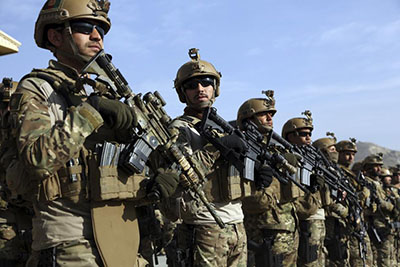Human Rights Watch, July 12, 2019
Afghanistan: Special Forces Raid Medical Clinic
4 Civilians Executed in Second Attack on Facility in Wardak Province
(Kabul) – Afghan special forces raided a medical clinic in Wardak province on the night of July 8-9, 2019, and executed four civilians, Human Rights Watch said today. Afghan authorities should promptly and thoroughly investigate the attack and appropriately prosecute those responsible.
Witnesses told Human Rights Watch that security forces entered the clinic in the Day Mirdad district. They killed a family caregiver and then detained and bound staff and family members accompanying patients. They then separated four people for questioning – the clinic’s director, a lab worker, a guard, and a family caregiver. All except the director were later found dead from gunshots. Under the laws of war, deliberate attacks on medical facilities and the summary killing of civilians or incapacitated combatants are war crimes.

Afghan special forces attend their graduation ceremony after a 6-month training program in Kabul. (Photo: Rahmat Gul/AP)
“Attacks on medical facilities challenge the very foundations of the laws of war, and will persist if those responsible go unpunished,” said Patricia Gossman, associate Asia director. “It’s imperative for the Afghan government to prosecute the commanders who ordered the killings as well as the soldiers who pulled the trigger.”
A member of the local health council told Human Rights Watch that at about 9 p.m. on July 8, he heard helicopters and knew a raid was underway. At 5 a.m., he and others from the health council went to the clinic and found the guard’s room shattered by a rocket that had left a crater.
A clinic staff member said that the special forces tied the hands of all the staff and visiting family caregivers and took them to one room, where they questioned them about whereabouts of the Taliban. Then they took four men with them, including the clinic’s director, Dr. Wahidullah, and told the remaining staff to stay in the room.
After the special forces unit had left, local villagers discovered the bodies of the three men who had been taken for questioning. The villagers were unable to locate Dr. Wahidullah, whom they believed the forces may have detained. The body of the other family caregiver was also found on the premises.
On July 11, the Swedish Committee for Afghanistan (SCA), a humanitarian organization that runs the clinic, described the incident as a “shocking violation” of international humanitarian law and said that “such outrageous use of force against civilians and health facilities constitutes a serious violation of applicable international humanitarian law and it affects provision of health services delivery to the people in the local community.” The clinic treats everyone, regardless of their political affiliation.
Afghan security forces had previously targeted the Day Mirdad clinic. On February 17, 2016, an Afghan special forces unit accompanied by international forces raided the facility, dragging away two patients and an 11-year-old child who was accompanying an adult patient, and shot dead all three outside the hospital premises.
Under international humanitarian law, or the laws of war, hospitals and other medical facilities are protected from attack unless they are being used for acts harmful to the enemy. Such acts do not include treating wounded and sick combatants. Even if a medical facility is being used to carry out harmful acts, such as to store weapons or as a headquarters, a warning with a reasonable time limit needs to be given before the hospital can be attacked.
The laws of war also protect medical workers and patients from attack. Article 3 common to the four Geneva Conventions of 1949, which is applicable to the armed conflict in Afghanistan, states that:
[P]ersons taking no active part in the hostilities, including members of armed forces who have laid down their arms and those placed “hors de combat” by sickness, wounds, detention, or any other cause, shall in all circumstances be treated humanely.... [P]rohibited at any time and in any place whatsoever with respect to the above-mentioned persons [is] violence to life and person, in particular murder of all kinds.
Summary killings of individuals in custody are war crimes. Commanders who order or otherwise assist, facilitate, aid, or abet the commission of a war crime can also be criminally liable. Governments have an obligation to investigate and appropriately prosecute alleged war crimes by members of their forces.
Night raids by Afghan special forces have increased sharply in 2019. In its April update on civilian casualties, the United Nations Assistance Mission for Afghanistan (UNAMA) noted that most search operations resulting in civilian casualties were attributed to either the National Directorate of Security Special Forces or other special forces units. These units operate largely outside the normal military chain of command and are supported by US Central Intelligence Agency (CIA) units.
UNAMA has also noted a recent increase in attacks that have resulted in the death of health workers at facilities run by nongovernmental organizations in contested areas.
“US forces who directly support Afghan special forces – whether military or intelligence – may also bear responsibility for abuses carried out by these units,” Gossman said. “The US government should investigate its involvement in operations that target protected facilities or otherwise violate the laws of war.”
Characters Count: 6220
